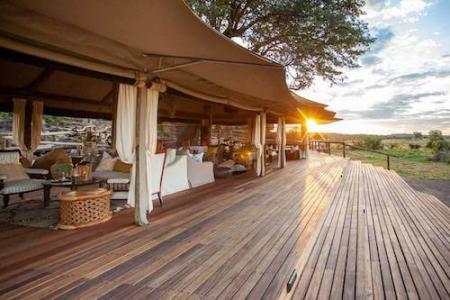 A pungent whiff of elephant poo tickles my nose as I sit on the deck outside my tented suite.
A pungent whiff of elephant poo tickles my nose as I sit on the deck outside my tented suite.
Eleven elephants are standing quietly in the mud about 100 metres away, with another jauntily strolling down to join them. They’re drawn by the water that bubbles up out of the ground in a ‘seep’ right in front of my room at Deteema Springs, a luxurious tented camp in Zimbabwe’s Hwange National Park.
I plonk my chair right at the edge of the elevated deck, then cautiously shift it slightly backwards - about a trunk length away. It’s a wise move, because the new elephant is drawn to the grass right in front of me. She’s so close that I hardly dare move to take some photos as she twists the grass with her trunk, yanks it out, and chomps it noisily. It’s magical, although I’m slightly relieved when she moves away to join her herd at a safer distance.
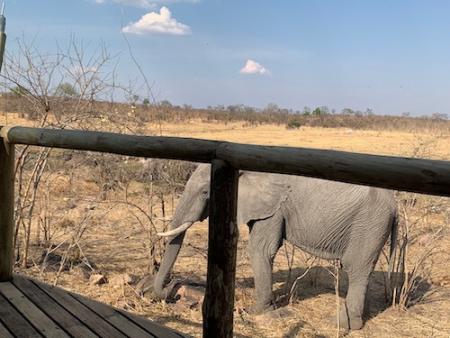 Then I notice a troop of baboons in the shade of a nearby tree watching me more more closely than I’m watching them, and I make a mental note to zip the tent tightly when I leave. ‘Tent’ is the wrong word really, since there’s a sturdy wooden floor, a double bed, en-suite bathroom and wardrobes. It’s so gorgeous that I decide I’ll skip the afternoon game drive and sit here while the animals come to me.
Then I notice a troop of baboons in the shade of a nearby tree watching me more more closely than I’m watching them, and I make a mental note to zip the tent tightly when I leave. ‘Tent’ is the wrong word really, since there’s a sturdy wooden floor, a double bed, en-suite bathroom and wardrobes. It’s so gorgeous that I decide I’ll skip the afternoon game drive and sit here while the animals come to me.
Deteema Springs sits in a small private concession in Hwange, which is part of the Kavango-Zambezi (KAZA) Transfrontier Conservation Area, the largest in the world that touches Angola, Botswana, Namibia, Zambia and Zimbabwe.
I arrived a few days after a wildfire had burned great swathes of the area, leaving an eerily apocalyptic landscape with ashes swirling in the wind and some thicker trees still smouldering. We see elephants walking over the blackened ground, then we reach an unscorched patch where a lion and two females are lazily contemplating an evening hunt. The burnt grass means most of the animals have gone elsewhere in search of food, but our guide Tulane Sibanda tells us the rains are due and within a week new grass will appear.
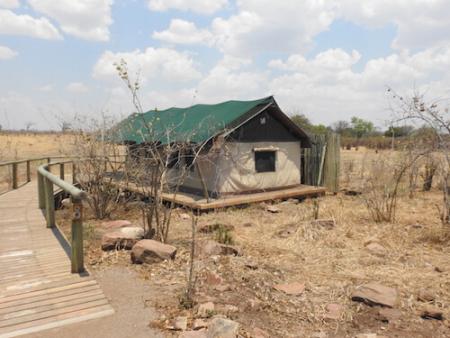 Deteema only opened in 2019 and it’s so remote that it runs on solar power, with hot water always available through a thermodynamic solar energy system, and a filtration plant for drinking water. To keep its footprint light it uses energy-efficient fridges and cold rooms and cellars to store heat-sensitive items.
Deteema only opened in 2019 and it’s so remote that it runs on solar power, with hot water always available through a thermodynamic solar energy system, and a filtration plant for drinking water. To keep its footprint light it uses energy-efficient fridges and cold rooms and cellars to store heat-sensitive items.
Its eight tents stand on raised decks linked by winding walkways, some close to the seeps and others facing Deteema Dam. The main lodge sits in the middle and it’s gorgeous, with a small swimming pool and a large open plan bar, lounges and dining area. A long deck runs right across the front, and when I tear myself away from my tent for a drink at the bar, I find the other guests intently staring at the grass ahead. A male lion has slunk out of sight into a dip, but he reappears soon to mate with a lioness.
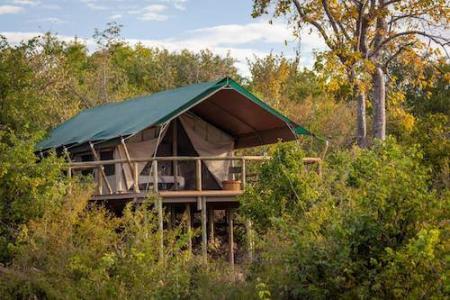 Then the action happens. A herd of truculent buffalo have wandered into the scene, and don’t take kindly to the lion. One buffalo chases him around some rocks, with the lion trying to look nonchalant by only jogging as far as necessary to avoid a confrontation. Soon the elephants arrive and side with the buffalo. One elephant scares the lion up onto some rocks, where he sits stubbornly trying to regain his dignity. He’s too outnumbered to cause trouble, and too embarrassed to flee. It’s a fabulous standoff, and we top up our drinks and wait for the outcome.
Then the action happens. A herd of truculent buffalo have wandered into the scene, and don’t take kindly to the lion. One buffalo chases him around some rocks, with the lion trying to look nonchalant by only jogging as far as necessary to avoid a confrontation. Soon the elephants arrive and side with the buffalo. One elephant scares the lion up onto some rocks, where he sits stubbornly trying to regain his dignity. He’s too outnumbered to cause trouble, and too embarrassed to flee. It’s a fabulous standoff, and we top up our drinks and wait for the outcome.
Next the weather joins in, with a hot wind searing out of nowhere and scattering sparks from the bonfire. There’s a rumble and a flash, and the staff leap into action, dousing the fire, bringing in the chairs they’d set outside for dinner, and zipping up the tent flaps.
The storm proves even more exciting than the lion-elephant-buffalo contest, with vast sheets of white lightning turning the sky bright, rain lashing down, and surround-sound thunderclaps that have the baboons shrieking in alarm. It’s spectacular, yet the dinner arrives only a few minutes late as the staff carry food hot from the kitchen under the shelter of sturdy umbrellas.
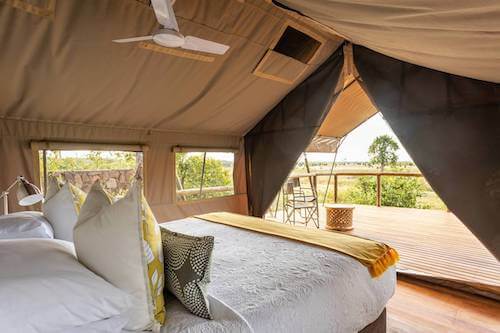 Deteema is in an isolated area of Hwange reached via a long dirt road. The whole camp closes during the rainy season from November to March, partly because it gets so hot but mostly because the ‘black cotton mud’ in this area is so dense and sticky that the roads become unpassable. We leave the next morning, and even after only one night of rain the road is tricky, with one of our safari vehicles temporarily glued down in the black porridgy mud. We joke about having to turn back and stay a few more nights, but sadly we make it out.
Deteema is in an isolated area of Hwange reached via a long dirt road. The whole camp closes during the rainy season from November to March, partly because it gets so hot but mostly because the ‘black cotton mud’ in this area is so dense and sticky that the roads become unpassable. We leave the next morning, and even after only one night of rain the road is tricky, with one of our safari vehicles temporarily glued down in the black porridgy mud. We joke about having to turn back and stay a few more nights, but sadly we make it out.
Deteema Springs Camp is part of Machaba Safaris. For details click here: